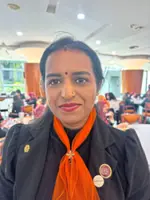A family is the most basic unit in society, and while families can be a central support system, they can also be a place where individuals experience exploitation and discrimination, says Musawah executive director Zharin Zhafrael.
“Family is a space for comfort, warmth, love, nurturing, emotional support and psychological security, as well as a place where the basic necessities for survival – food, shelter, clothing – are met. It serves to promote order and stability within society as a whole. It’s where we learn lessons, how to differentiate right from wrong, and to help and care for each other,” says Zharin.





